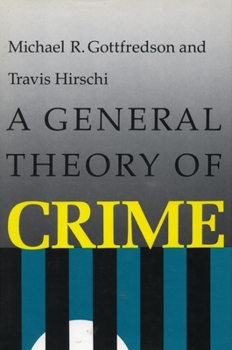A General Theory of Crime
Select Format
Select Condition 
Book Overview
By articulating a general theory of crime and related behavior, the authors present a new and comprehensive statement of what the criminological enterprise should be about. They argue that prevalent academic criminology--whether sociological, psychological, biological, or economic--has been unable to provide believable explanations of criminal behavior. The long-discarded classical tradition in criminology was based on choice and free will,...
Format:Paperback
Language:English
ISBN:0804717745
ISBN13:9780804717748
Release Date:March 1990
Publisher:Stanford University Press
Length:316 Pages
Weight:1.02 lbs.
Dimensions:0.8" x 6.0" x 9.0"
Customer Reviews
4 ratings
Reviewing the Reviewer: David Redmon
Published by Thriftbooks.com User , 19 years ago
I haven't read the book, but I do intend to purchase it based on the unfavorable review of David Redmon. I hadn't encountered a thought process or vocabulary such as his since taking a couple of undergraduate sociology courses for easy A's in the early & mid'70's. I could not avoid breaking up & laughing out loud at my office when I read, "Gaining self-control only ensures that people will remain docile, obediant & less resistant." Far-f___ing out, Man! (I hope he doesn't bring his kids to any restaurant where I'm eating, as I'm sure his disdain for self-control & obediance will be reflected in their running wild & yelling, much to the displeasure of those of us who believe self-control & obediance are frequently virtues.) This fellow is a caricature of the Leftist/Marxist-chic student so popular when Communism (not to mention a disregard for more traditional values) was perceived to be on the rise 30 some years ago. Although Communism has been consigned to the proverbial junk-heap of history since then--and a long lost respect for traditional values has emerged-- Mr. Redmon no doubt laments those developments, if he's even cognizant of them. I can't wait to read his other reviews. It will be like entering a time warp & remembering my carefree college days.
Perfect For What It Is
Published by Thriftbooks.com User , 20 years ago
This book is the best presentation of control theory in criminology. If you are prone to Marxist criminology, this book will drive you nuts. The problem that G & H run into a lot, however, is what makes a crime a crime. If a man saved a baby from being inside a locked car by breaking the front window, how exactly is that different (in terms of property damage) from a gang member getting his kicks -- breaking a car window at random? Why is one act right, but the other act wrong? The consequences are the same. So is crime all about intention and not consequences? G & H could have clarified this point more.
The Best Book On Crime and Criminals in the 20th Century
Published by Thriftbooks.com User , 21 years ago
"A general theory of crime" represents a paradigm shift in the way we think about crime and criminals. Like any other scientific paradigm shift, there has been great resistance to the theory by sociologists who continue to blame crime on social deprivation, poverty and other social causes. The book discredits old sociological theories and illustrates that the cause of crime is poor parenting and the failure of parents to teach their children to delay gratification. Since the book's publication, it has been the most widely tested theory in criminology with substantial empirical support. If you want to understand the mind of a criminal offender and the nature of criminality, this is the book for you. The book also describes the necessary conditions for individual crimes to occur, a section that is valuable for readers who want to prevent their own victimization. In addition, the book demonstrates that offenders do not specialize in crime types like murder and sex crimes; instead, offenders tend to commit a wide variety of crimes and engage in a variety of self-destructive behaviors like drinking, drugging, speeding, traffic accidents, and promiscuous sex. Perhaps the most controversial aspect of the general theory is the data presented that links age and crime, with peak arrest rates occurring between the ages of 17 and 19 and precipitously dropping off after the teenage years. The implications of the book for preventing crime are that we need to spend more money on early childhood programs that teach parents how to love their children and instill in them the self-control they need to delay gratification (such staying in school) and generally engage in long-term rather than short-term thinking.
Good bookon Self - Control Theory
Published by Thriftbooks.com User , 25 years ago
who better to describe a theory than those who originated the thoery





